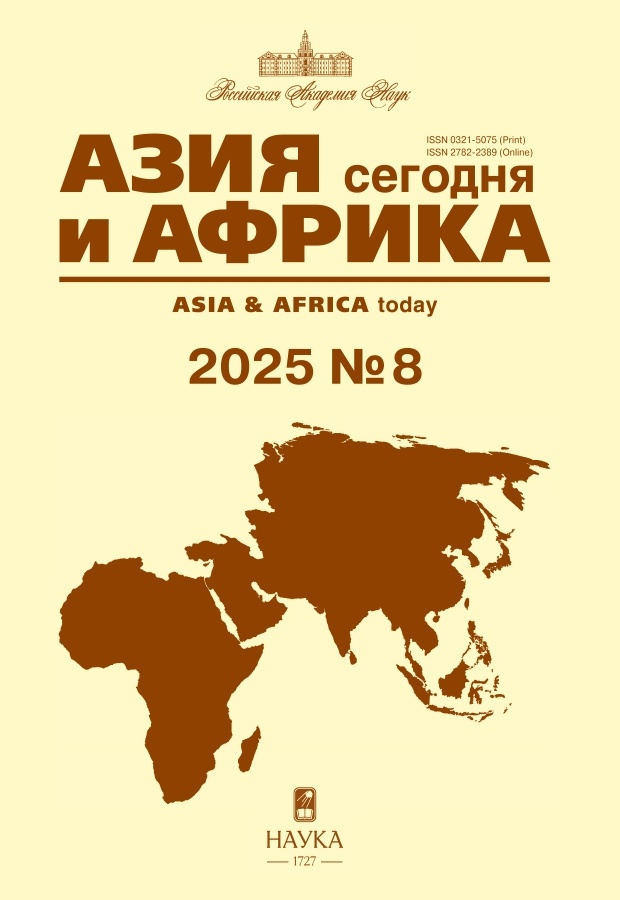Роль западных медиа в формировании восприятия России населением Западной Африки
- Авторы: Зинг М.Й.1,2, Шишкина А.Р1,2
-
Учреждения:
- НИУ ВШЭ
- Институт Африки РАН
- Выпуск: № 8 (2025)
- Страницы: 31-38
- Раздел: Политика, экономика
- URL: https://kazanmedjournal.ru/0321-5075/article/view/690664
- DOI: https://doi.org/10.31857/S0321507525080043
- ID: 690664
Цитировать
Полный текст
Аннотация
Целью исследования является оценка роли западных СМИ в формировании восприятия России населением Западной Африки. Авторы использовали как количественные, так и качественные методы для работы с данными, собранными в ходе полевых работ по изучению образа России в Африке за последние несколько лет (2020–2023). Для анализа данных, собранных в ходе экспертных интервью, был использован тематический анализ, подкрепленный устными цитатами из экспертных интервью. Ключевым и новаторским выводом исследования является то, что существует положительная связь между ролью западных СМИ, освещающих Россию, и их влиянием на формирование восприятия России Западной Африкой. Авторы приходят к выводу, что чем больше репортажей о России транслируется западными СМИ, тем выше вероятность формирования положительного образа России.
Ключевые слова
Об авторах
М. Й.Б Зинг
НИУ ВШЭ; Институт Африки РАН
Автор, ответственный за переписку.
Email: micah.zing@gmail.com
аспирант, факультет социальных наук Москва, Россия
А. Р Шишкина
НИУ ВШЭ; Институт Африки РАН
Email: alisa.shishkina@gmail.com
кандидат политических наук, веду- щий научный сотрудник, Центр изучения стабильности и рисков, НИУ ВШЭ; научный сотрудник, Центр циви- лизационных и региональных исследований Москва, Россия
Список литературы
- Bondarenko D.M. 2012. The Image of Russia in Africa: The Soviet Legacy’s Role. Proceedings of the 8th Iberian Congress of African Studies. Madrid.
- Issaev L.M., Shishkina A.R., Liokumovich Y.B. 2022. Perceptions of Russia’s ‘return’ to Africa: Views from West Africa. South African Journal of International Affairs. № 29 (4). Pp. 425–444.
- Olivier G., Suchkov D. 2015. Russia is back in Africa. The Strategic Review for Southern Africa. 37 (2). Pp. 146–167.
- Schmidt E. 2013. Foreign intervention in Africa: From the cold war to the war on terror. Cambridge University Press.
- Korendyasov E.N. 2016. The new start for Russian-African relations. Vestnik RUDN. International Relations. 16 (2). Pp. 203–214.
- Bourgault L.M. 1995. Mass media in sub-Saharan Africa. Indiana University Press.
- Coban F. 2016. The Role of the media in international relations: From the CNN Effect to the Al-Jazeere Effect. Journal of International Relations and Foreign Policy. 4 (2). Pp. 45–61.
- Boyd-Barrett O. 2016. Western mainstream media and the Ukraine crisis: A study in conflict propaganda. Routledge.
- Matusevich M. 2019. Russia in Africa. Insight Turkey. 21 (1). Pp. 25–40.
- Kamat V. 2008. This is not our culture! Discourse of nostalgia and narratives of health concerns in post-socialist Tanzania. Africa. 78 (3). Pp. 359–383.
- McCombs M., Valenzuela S. 2020. Setting the agenda: Mass media and public opinion. John Wiley & Sons.
- Roff K.L. 2013. Barbaric mistakes: Western print media’s portrayal of “ethnic” conflicts. University of Canterbury.
- Ellul J. 1973. Propaganda: The Formation of Men’s Attitudes. New York: Vintage Books.
- Lasswell H.D. 1927. The Theory of Political Propaganda. American political science review. 21 (3). Pp. 627–631.
- Ballantyne A.G. 2016. Climate change communication: what can we learn from communication theory? Wiley Interdisciplinary Reviews: Climate Change. 7 (3). Pp. 329–344.
- Payne K. 2009. Winning the battle of ideas: Propaganda, ideology, and terror. Studies in Conflict & Terrorism. 32 (2). Pp. 109–128.
- McCombs M., Reynolds A. 2002. News influence on our pictures of the world. Media effects. Routledge. Pp. 11–28.
- Sciarini P., Tresch A. 2019. The political agenda-setting power of the media: the Europeanization nexus. Journal of European Public Policy. 26 (5). Pp. 734–751.
- McCombs M. 1977. Agenda setting function of mass media. Public relations review. 3 (4). Pp. 89–95.
- Bennett W.L., Iyengar S. 2008. A new era of minimal effects? The changing foundations of political communication. Journal of communication. 58 (4). Pp. 707–731.
- McCombs M., Stroud N.J. 2014. Psychology of agenda-setting effects: Mapping the paths of information processing. Review of Communication Research. 2. Pp. 68–93.
- Giannotta V. 2023. Western Perception and Media Coverage of Türkiye’s Elections. Insight Turkey. 25 (2). Pp. 37–46.
- Branson P. 1999. Systems and Components. Electronics Education. Pp. 12–15.
- Mahadeo M., McKinney J. 2007. Media representations of Africa: Still the same old story. Policy & Practice: A Development Education Review. 4 (2). Pp. 14–20.
- Wanta W., Golan G., Lee C. 2004. Agenda setting and international news: Media influence on public perceptions of foreign nations. Journalism & Mass Communication Quarterly. 81 (2). Pp. 364–377.
- McFadden D. 1972. Conditional logit analysis of qualitative choice behavior. University of California.
Дополнительные файлы











